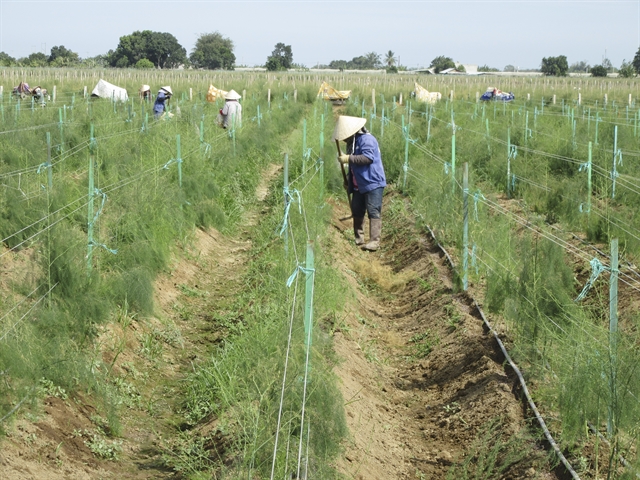 Society
Society

 |
| Farmers in Ninh Thuận Province tend their asparagus crop. — VNA/VNS Photo Nguyễn Thành |
NINH THUẬN — More and more farmers in the south – central province of Ninh Thuận are switching crops to fit natural conditions and adapt to climate change.
In the country’s driest province with its dry and hot weather, to save irrigation water they grow crops such as grapes, jujube, seedless lime, custard apple, and asparagus.
Tống Minh Hoàng was one of the earliest in Ninh Phước District’s Phước Thuận Commune to grow the foreign varieties of shine Muscat and black sapphire to sell as table grapes in his 2,000sq.m orchard.
He has harvested once already and sold the shine Muscat grapes at VNĐ350,000 (US$15) a kilogramme and black sapphire at VNĐ250,000 ($11).
He earned VNĐ600 million ($25,700), more than he would get from traditional grape varieties, he said.
The two grow well and are suitable for growing in his area, he said.
Ninh Thuận is the country’s largest grape producer.
Besides grape, farmers have also switched to new varieties of jujube, asparagus, corn seeds, raspberry, and water melon to earn higher incomes.
Từ Văn Hay in Ninh Phước District’s An Hải Commune has linked up with the Tuấn Tú General Service Co-operative to grow asparagus on 3,000sq.m of land.
He used to grow a number of different vegetables, but with demand and income not being steady he switched to asparagus in 2017 since it has consistently high demand and grows well in his area.
He harvests 8 – 12 kilogrammes of asparagus every day and sells them to the co-operative at VNĐ50,000 ($2.1) a kilogramme, he said.
“I earn VNĐ15 – 20 million ($640 – 850) a month.”
Farmers have restructured crops on 9,546ha, including 6,402ha of rice fields, since 2016, according to the local Department of Agriculture and Rural Development.
The province has supported them with subsidies of VNĐ19 billion ($814,000) to buy seeds and other inputs and production facilities.
It encourages farmers to use efficient irrigation facilities to save water, and has 1,773ha equipped with them already.
The restructuring of crops has reduced the use of water by 25 – 30 per cent compared to the time when farmers mainly grew rice, and this has helped increase their incomes and reduce the extent of fallow lands due to water shortages, according to the department.
The incomes from growing short-term crops like green bean, sesame, water melon, and corn seed are 1.4 – 5.5 times higher than from rice, it said.
Planning
The province plans to restructure cultivation on 3,200ha in the 2021-25 period.
Crops with high economic value and resistance to dry weather like grapes, jujube, asparagus, hybrid corn, green bean, grapefruit, sour sop, bananas, durian, and mangoes are given priority.
The province wants to increase the application of advanced farming techniques and intercropping to improve incomes and soil fertility.
The cultivation of bean varieties in fruit orchards and perennial tree growing areas has helped retain soil humidity and improve fertility.
Farmers use nets to cover their fruit trees from pests, improving yield and quality.
Đặng Kim Cương, director of the department, said to increase the efficiency of restructuring the department would provide more training in new techniques to farmers and expand efficient farming models.
The province plans to create favourable conditions for agricultural companies and households to invest in technology and develop value chains.
It will develop agro- and eco-tourism to diversify agricultural products, ensuring farmers have stable outlets and higher incomes.
It will invest in agricultural infrastructure, develop brands and foster deep processing of agricultural products to create high-value products. — VNS




